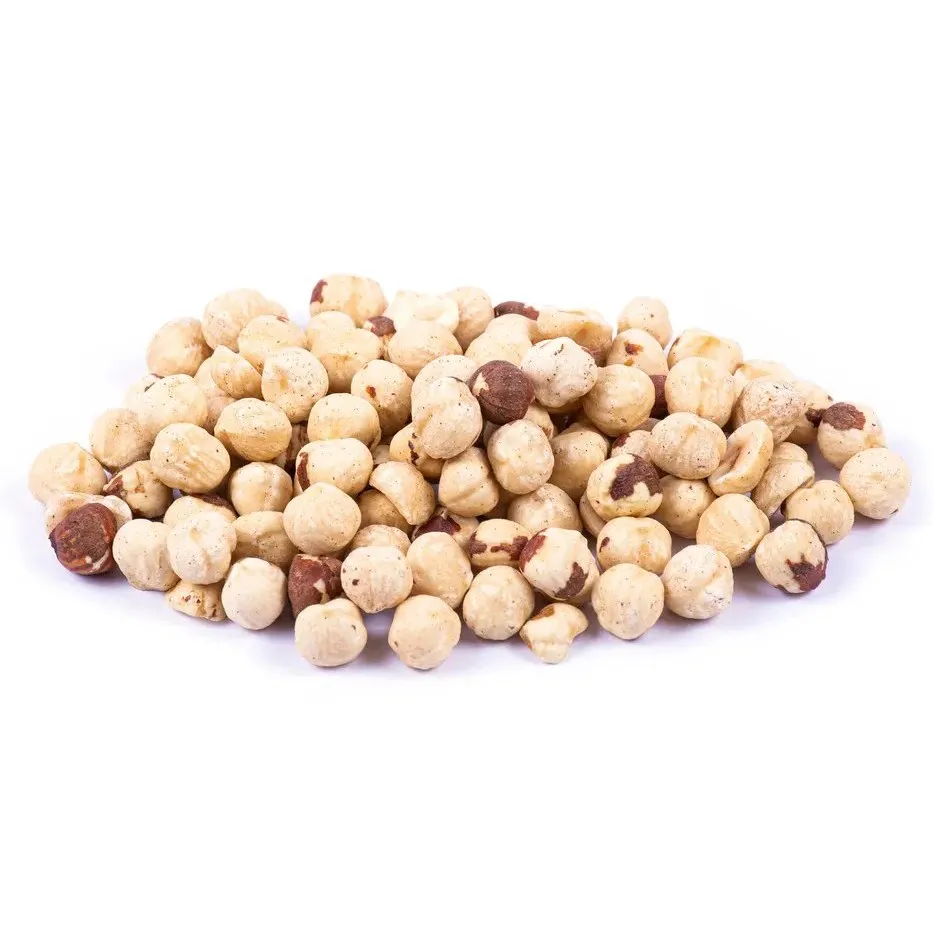Hazelnuts are delicious and nutrient-rich nuts that have been enjoyed for centuries across various cultures. These small, versatile kernels originate from the hazelnut tree, scientifically known as Corylus avellana. Hazelnut kernels are not only a popular ingredient in many culinary dishes and confectioneries but are also valued for their numerous health benefits. Packed with essential nutrients, hazelnut kernels offer a wide range of advantages, including heart health, improved brain function, balanced blood sugar levels, and more. In this article, we will delve deeper into the nutritional profile of hazelnuts and explore their many health benefits.
1. Nutrient-rich Composition:
Hazelnut kernels are incredibly nutrient-dense and contain a balanced composition of macronutrients, vitamins, minerals, and antioxidants. A typical 1-ounce (28g) serving of hazelnut kernels contains:
– Calories: Approximately 176 calories
– Macronutrients: 4 grams of protein, 18 grams of fat (mainly monounsaturated and polyunsaturated fats), and 4 grams of carbohydrates (including dietary fiber)
– Vitamins: Rich in vitamin E, hazelnuts provide over half of the daily recommended intake in just one serving. They also contain small amounts of B vitamins, such as folate, thiamin, and vitamin B6.
– Minerals: Hazelnuts are a good source of minerals like copper, manganese, magnesium, phosphorus, and potassium. These minerals play key roles in various physiological functions in the body.
– Antioxidants: Hazelnut kernels contain antioxidant compounds such as phenolic acids and flavonoids, which help protect against oxidative stress and inflammation.
2. Heart Health:
Regular consumption of hazelnut kernels has been associated with several heart health benefits. The nutrient composition of hazelnuts, particularly their high content of monounsaturated fats, vitamin E, and antioxidants, contributes to these positive effects. Some specific benefits include:
– Reduced Risk of Cardiovascular Disease (CVD): Hazelnuts have been shown to lower LDL cholesterol levels and improve the overall cholesterol profile. They also help lower blood pressure and reduce inflammation, all of which contribute to a decreased risk of CVD.
– Improved Endothelial Function: The bioactive compounds found in hazelnuts can enhance endothelial function, promoting healthy blood vessels and reducing the risk of cardiovascular problems.
3. Brain Health:

Hazelnut kernels are also known for their positive impact on brain health. The combination of various nutrients found in hazelnuts contributes to cognitive function improvement and may help prevent age-related cognitive decline. Some key benefits include:
– Neuroprotective Qualities: The antioxidants and phytochemicals in hazelnuts help protect the brain from oxidative stress, reducing the risk of neurodegenerative diseases like Alzheimer’s and Parkinson’s.
– Improved Memory and Concentration: The vitamin E and flavonoids present in hazelnut kernels have been linked to improved memory, focus, and overall cognitive performance.
4. Blood Sugar Control:
The nutritional profile of hazelnut kernels makes them an excellent choice for individuals concerned about blood sugar control and diabetes management. Here’s how hazelnuts can contribute to stable blood sugar levels:
– Low Glycemic Index: Hazelnuts have a low glycemic index (GI), meaning they release glucose into the bloodstream slowly. This gradual release prevents spikes in blood sugar levels after consumption.
– High Fiber Content: Hazelnuts are rich in dietary fiber, which slows down digestion and the absorption of glucose from other carbohydrates, helping to maintain balanced blood sugar levels.
– Improved Insulin Sensitivity: Regular consumption of hazelnuts has been linked to improved insulin sensitivity, which can be beneficial for individuals with diabetes or insulin resistance.
5. Weight Management:
Hazelnut kernels can be a valuable addition to a well-balanced diet for those seeking healthy weight management. Here’s how hazelnuts can support weight loss:
– Satiety and Reduced Snacking: The combination of protein, healthy fats, and dietary fiber in hazelnuts helps promote a feeling of fullness, reducing the risk of overeating or snacking between meals.
– Metabolic Boost: Hazelnuts contain high amounts of magnesium, a mineral known for its involvement in energy metabolism. Adequate magnesium intake may help optimize metabolic function.
6. Nutritional Support during Pregnancy:
Hazelnut kernels provide essential nutrients and minerals that can be beneficial during pregnancy. Some important advantages include:

– Folate Content: Hazelnuts are a good source of folate, an essential nutrient for healthy fetal development, including neural tube formation and red blood cell production.
– Healthy Fat Intake: The monounsaturated fats in hazelnuts are beneficial for fetal brain development and the mother’s overall health.
Conclusion:
Hazelnut kernels are a delicious and nutritious addition to a healthy diet, offering a wide range of health benefits. From promoting heart health and brain function to aiding in weight management and blood sugar control, hazelnuts provide a myriad of advantages. Incorporating hazelnuts into your diet in moderation can contribute to a well-balanced lifestyle, providing you with essential nutrients, antioxidants, and healthy fats. So, next time you reach for a snack, consider hazelnut kernels as a nutritious and tasty option.Title: Exploring the Nutritional Benefits of Hazelnut Kernels for the Food and Beverage Industry
Introduction:
Hazelnut kernels are not only a popular snack and baking ingredient but also offer a range of health benefits. In addition to their nutritional advantages, hazelnuts have gained popularity in the food and beverage industry for their versatility and unique flavor profile. This article will explore the benefits of hazelnut kernels from a business perspective, focusing on how food and beverage companies can incorporate them into their products to cater to health-conscious consumers and capture a potentially lucrative market segment.
1. Hazelnuts as a Nutrient-packed Ingredient:
Hazelnut kernels’ rich nutritional profile makes them an attractive ingredient for health-focused food and beverage products. Their high levels of protein, dietary fiber, and healthy fats contribute to satiety and overall nutritional value. Companies looking to develop products that prioritize nutrition can consider incorporating hazelnuts to enhance the health profile and appeal of their offerings.
2. Health Claims and Marketing Potential:
The health benefits associated with hazelnut kernels provide an opportunity for businesses to promote their products with relevant health claims. With proven advantages such as heart health support, improved brain function, blood sugar control, and weight management, companies can leverage these benefits to attract health-conscious consumers. Incorporating hazelnuts into marketing materials and labeling can differentiate products in a competitive market.
3. Hazelnuts for Bakery and Confectionery Products:
Hazelnuts are a classic ingredient in bakery and confectionery products due to their rich flavor and crunchy texture. Their versatility allows for various applications, including cakes, cookies, chocolates, and spreads like Nutella. Companies in the bakery and confectionery sector can add hazelnuts to their recipes to enhance taste, texture, and nutritional value, appealing to consumers who seek indulgence without compromising on health.
4. Utilizing Hazelnuts in Plant-based Alternatives:
The rising demand for plant-based alternatives presents an opportunity for food and beverage businesses to incorporate hazelnut kernels into plant-based products. Hazelnuts can serve as a nutritious alternative to dairy-based ingredients, offering a creamy texture and flavor. Plant-based milk, yogurt, cheese, and ice cream made with hazelnut kernels can cater to the growing vegan and lactose-intolerant consumer segments.

5. Snack Foods and Nut Butters:
Snack foods and nut butters are increasingly popular among health-conscious consumers, and hazelnuts are an ideal ingredient to enhance the nutritional profile of such products. Companies can create snack bars, granola mixes, and energy balls by combining hazelnuts with other nuts, dried fruits, and seeds. Hazelnut butter, a creamy spread made from hazelnuts, can also serve as a healthier alternative to traditional spreads and can be used in various applications, including sandwiches, smoothies, and desserts.
6. Hazelnuts for Culinary Applications:
Hazelnut kernels can add depth and richness to savory dishes, making them an enticing ingredient for culinary applications. Incorporating hazelnuts into salad dressings, sauces, and marinades can provide a unique flavor profile and enhance the overall dining experience. Additionally, toasted and crushed hazelnuts can be used as a garnish in various savory dishes, adding a pleasant crunch and nutty aroma.
7. Nutritional Snacking Solutions:
As consumers increasingly seek healthier snacking options, hazelnut kernels can play a crucial role in the development of nutritious and convenient snacks. Companies can create pre-packaged nut mixes that include hazelnuts, providing a balanced combination of proteins, fats, and fiber. Such products can cater to on-the-go consumers and individuals looking for guilt-free snacking options.
8. Hazelnuts in the Beverages Industry:
The versatility of hazelnut kernels extends to the beverages industry, offering new and exciting opportunities. Companies can incorporate hazelnut flavors into beverages, including coffee, hot chocolate, smoothies, and milkshakes. Hazelnut milk, produced by blending hazelnut kernels with water, can serve as a dairy alternative in coffee shops and retail outlets catering to lactose-intolerant or vegan consumers.
9. Premium and Gourmet Products:
Hazelnuts are often associated with gourmet and premium food products. Their unique taste, nutritional benefits, and versatility make hazelnut kernels an ideal choice for companies targeting the niche market of gourmet and luxury food offerings. Incorporating hazelnuts into high-quality chocolates, confections, spreads, and desserts can elevate the perceived value of the products and attract consumers willing to indulge in premium experiences.
10. Hazelnut Suppliers and Partnerships:
To ensure the consistent supply of high-quality hazelnut kernels, businesses in the food and beverage industry can establish partnerships with hazelnut growers, processors, and suppliers. Collaborating with reliable suppliers allows companies to maintain control over the sourcing process, ensuring the quality and traceability of the hazelnuts used in their products. These partnerships can also bring about research and development opportunities to explore new applications and markets.
Conclusion:
The nutritional benefits and versatility of hazelnut kernels make them an attractive ingredient for food and beverage companies looking to cater to health-conscious consumers. By incorporating hazelnuts into various product categories, businesses can enhance taste, texture, and nutritional value while appealing to market segments focused on heart health, brain function, blood sugar control, and weight management. Hazelnuts offer opportunities for creating bakery and confectionery products, plant-based alternatives, snack foods, culinary applications, and beverages, among others. By capitalizing on hazelnuts’ health benefits and developing innovative products, companies can tap into the growing market of health-conscious consumers and gain a competitive edge in the industry.









